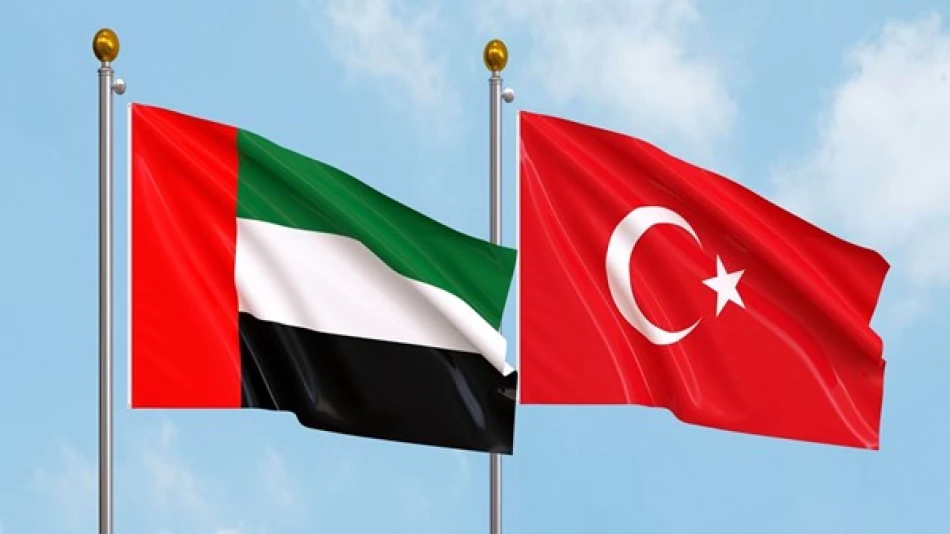
UAE and Turkey Strengthen Strategic Partnership with High-Level Talks
UAE and Turkey Forge Strategic Partnership with Eye on Energy Transition and Regional Stability
The UAE and Turkey have elevated their bilateral relationship to new heights following a historic state visit by President Sheikh Mohammed bin Zayed Al Nahyan to Ankara, where both nations signed seven agreements and established a High Strategic Committee. The partnership positions both countries as key players in the Middle East's energy transition while strengthening economic ties that could reshape regional trade dynamics.
Strategic Committee Marks New Chapter in Gulf-Turkey Relations
The inaugural meeting of the UAE-Turkey High Strategic Committee on July 16, 2025, represents a significant diplomatic milestone for both nations. This high-level mechanism demonstrates how Gulf states are diversifying their strategic partnerships beyond traditional Western allies, particularly as regional dynamics shift following years of political tensions in the Middle East.
The establishment of this committee follows a broader trend of Gulf-Turkey rapprochement that began in earnest after 2021, when economic pragmatism began outweighing political disagreements. Similar to how the UAE has strengthened ties with other regional powers like Egypt and Israel, this partnership reflects Abu Dhabi's strategy of building multiple diplomatic bridges to enhance regional stability.
Energy Cooperation Takes Center Stage
Renewable Energy Ambitions Align with COP28 Goals
Both countries have committed to supporting the global target established at COP28 to triple renewable energy capacity and double energy efficiency improvements by 2030. This alignment is particularly significant given the UAE's role as COP28 host and its $30 billion commitment to climate finance through ALTÉRRA, the world's largest climate-focused investment fund.
Turkey's energy needs present substantial opportunities for UAE investors. With Turkey importing roughly 75% of its energy requirements, partnerships with the UAE's renewable energy champions like Masdar could accelerate Turkey's clean energy transition while providing attractive returns for Emirati sovereign wealth funds.
Hydrocarbon Sector Collaboration
The agreement to enhance cooperation in both renewable energy and hydrocarbons reflects the practical reality that both nations will rely on oil and gas revenues to fund their energy transitions. This dual approach mirrors strategies employed by other major energy exporters like Saudi Arabia and Norway, which use hydrocarbon profits to invest heavily in renewable technologies.
Economic Integration Through Comprehensive Partnership
The comprehensive economic partnership framework discussed during the visit builds on existing bilateral trade mechanisms, including joint economic and commercial committees. Trade between the UAE and Turkey has grown significantly, reaching approximately $19 billion in 2023, but both sides see potential for much greater integration.
The focus on creating "integrated and flexible trade routes" suggests both countries are looking to position themselves as crucial links in evolving global supply chains. This is particularly relevant as businesses seek alternatives to traditional routes through the Suez Canal, especially following recent disruptions in Red Sea shipping.
Water Security and Climate Resilience
The emphasis on the UN Water Conference 2026, to be hosted by the UAE in partnership with Senegal, highlights water security as a critical shared challenge. The Mohammed bin Zayed Water Initiative, praised during the discussions, represents the UAE's recognition that water scarcity could become a major source of regional instability.
For Turkey, which controls the headwaters of the Tigris and Euphrates rivers, water diplomacy has become increasingly important in its relationships with downstream neighbors. Collaboration with the UAE on water technology and management could enhance Turkey's role as a regional water security partner.
Defense and Security Cooperation Expands
The renewed commitment to defense and security cooperation through capacity building and knowledge exchange reflects both countries' concerns about regional stability. Turkey's defense industry has gained significant international recognition, particularly for its drone technology, while the UAE has emerged as a major defense investor and technology hub.
This cooperation could prove mutually beneficial: Turkey's defense manufacturing capabilities complement the UAE's financial resources and strategic location, potentially creating a formidable partnership in the regional defense sector.
Implications for Regional Dynamics
The UAE-Turkey strategic partnership signals a broader realignment in Middle Eastern geopolitics. Both countries are positioning themselves as pragmatic powers focused on economic development rather than ideological confrontation. This approach contrasts sharply with the polarization that characterized regional politics in the previous decade.
For investors and businesses, this partnership creates new opportunities in sectors ranging from renewable energy to defense technology. The commitment to hold the next High Strategic Committee meeting in Abu Dhabi in 2026 suggests both sides are serious about maintaining momentum in their cooperation.
The seven agreements signed during the visit, while not detailed in the announcement, likely cover specific implementation mechanisms for the broader cooperation framework. As both countries work to diversify their economies and enhance regional influence, this partnership could serve as a model for other Middle Eastern nations seeking to balance economic pragmatism with strategic autonomy.
Most Viewed News

 Layla Al Mansoori
Layla Al Mansoori






